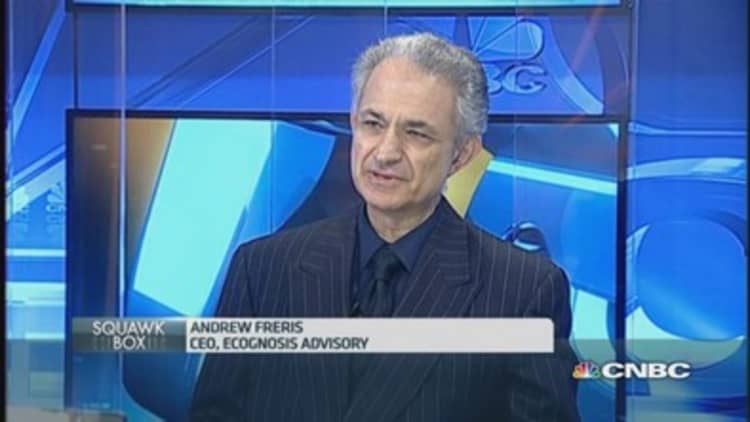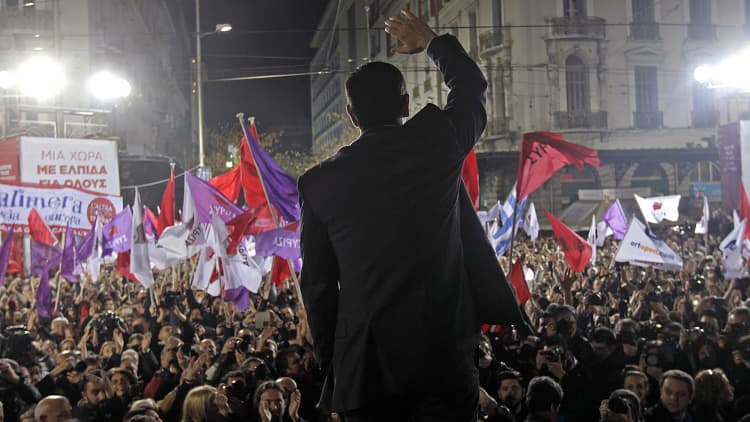He has promised to restructure the debt. He has said it is time to change laws "that allow the rich to keep stealing from us." He has vowed that Brussels "cannot threaten us" and that "we don't want any more heads of government who obey and don't negotiate."
If it sounds familiar, no, this is not in Greece. It is in Spain.
To many Spaniards, the man behind the statements, Pablo Iglesias, is known simply as "the one with the ponytail."
But besides his hairstyle and penchant for discount clothing, Mr. Iglesias and his Podemos party are radically shaking up Spain's political establishment, mirroring the ascent of Syriza, the far-left party that swept to power in Greece in January on a powerful anti-austerity message.
"I really never thought I could become president of the government, but I think we're now in a situation where this could happen," Mr. Iglesias said in a recent interview at his new party headquarters.

That possibility remains distant for the moment. The first challenge facing Mr. Iglesias, 36, a political-science professor who founded his party on a shoestring last year, is much the same already navigated by his Greek counterparts: Can a party from the radical left break into the old political establishment and get elected nationally?
The second challenge is also shared with his fellow Greek travelers: In doing so, can his party remain true to its talk?
Having succeeded at the first part, Prime Minister Alexis Tsipras of Greece, 40, an upstart of the same generation, has already faced a steep learning curve on how to reconcile his Syriza party's promises with the reality of Greece's financial calamity, bending to a deal with Brussels in February that many of his party faithful condemned as a sellout.
A careful student of politics who started out as a 14-year-old youth member of the Communist Party, Mr. Iglesias is already tinkering, if not with the strident tone of Podemos's message, then with its program.
Read MoreRight wing in Europe could bring 'turmoil'
He is gradually tweaking it ahead of a first run at national elections later this year, trying to bring the party's plan down to earth and broaden its appeal. In doing so, Podemos runs the risk of selling its soul and alienating its core support among Spain's discontented and disenfranchised, who have thrust the fledgling party to prominence with meteoric speed.
Mr. Iglesias welcomes comparisons between Podemos and Syriza, but he has been careful to distance Podemos from anti-establishment parties on the right that have made similarly big strides riding voter dissatisfaction with Brussels, like the United Kingdom Independence Party in Britain or the National Front in France.
"We're perhaps all part of a general situation of dissatisfaction with the politics of Europe, but the big difference is that we are democratic, pro-European and clearly not racist," Mr. Iglesias said.
"Political forces like Podemos and Syriza provide among the last opportunities to convince citizens that something positive can still be achieved within a European Union project," he added.
Last May, Podemos won almost 8 percent of the Spanish vote in elections for the European Parliament, which helped deny the conservative Popular Party of Prime Minister Mariano Rajoy and the opposition Socialists a majority of votes for the first time since the country's return to democracy in the late 1970s.
Since then, Podemos has made further gains in opinion polls, raising the prospect of the most open race in Spain's modern history in a busy voting year that starts this month with a regional election in Andalusia and culminates in a general election around November.
Since presenting his party's program last year, which read like a long wish list, Mr. Iglesias has begun softening some claims, notably over whether an ailing country was entitled to renege on its debt.
Instead, Mr. Iglesias now says debt repayment schedules should be "linked to growth," spread out long enough to ensure that a country does not fall deeper into recession. "Debts have to be paid, but it's got to be in a viable way," he said.

In November, Podemos presented a new program, elaborated by two economists, that included limiting the working week to 35 hours — similar to rules imposed in France under a Socialist administration — and revising the statutes of the European Central Bank to make full employment one of its goals.
The program also calls for new taxes on the wealthy and on financial transactions. It promises higher pensions and salaries, as well as a rise in spending on health care, education and other social services — without, however, elaborating on how those plans would be paid for.
"We stood in the European elections, but now we have to be a lot more precise and assume the responsibility of governing a state in very difficult conditions," Mr. Iglesias said. "Our program can't just be promises and good intentions."
Spain, however, is not in the same situation as Greece, whose Syriza-led government has been tussling with its creditors and European Union partners over how to avoid defaulting on its debt.
Instead, Mr. Rajoy recently told lawmakers that Spain's economy, which has inched out of recession, had "come out of the nightmare" and was now growing more strongly than that of any other major European nation, even at just 1.4 percent for all of 2014.
In a thinly veiled reference to Podemos, Mr. Rajoy told Parliament that "with demagogy, you don't maintain the welfare state, you destroy it."
Mr. Iglesias had a ready riposte, noting before a gathering of party faithful that many families still struggled to get by. "The nightmare, Mr. Rajoy, is the reality of our country," he declared.
More from the New York Times:
5 French athletes are mourned after Argentine air crash
Obama said to resist growing pressure from all sides to arm Ukraine
Charlie Hebdo attacks spur run on newspapers
While Mr. Rajoy is hoping to convince voters that the country's economic turnaround is meaningful, Mr. Iglesias insists that the benefits of Spain's return to growth are being felt only by "the old privileged elite."
It is the kind of argument — often made with a ready arsenal of facts and figures in the style of the university professor he is — that one would expect of a man named for Pablo Iglesias, the 19th-century father of Spanish Socialism.
But the media-savvy Mr. Iglesias, a regular presence on television chat shows even before he started Podemos, is the first to admit that to win a general election, Podemos must move beyond its radical roots.
"I come from the left, but current society should no longer be understood in terms of right and left, but in terms of those who are above and those who are below, the privileged elite and the majority," he said.
Indeed, his criticism of Spain's long-established Socialist Party, until now the largest opposition party, has been equally unsparing, threatening to divide the opposition vote in ways that could buoy Mr. Rajoy.
Mr. Iglesias called Podemos "the real opposition," charging that the Socialists had rubber-stamped the austerity program imposed by Mr. Rajoy's governing Popular Party.
"In economic terms, these two parties have been in an agreement," he said.
Though a leader of his own party was recently embroiled in accusations of fraud, Mr. Iglesias also says the mainstream parties share the blame for "allowing us to reach levels of corruption that are scandalous."
Since the economic tide went out with the financial crisis of 2008, more than 150 corruption cases involving politicians of all stripes have proliferated around the country.
But as elections quickly approach, Mr. Iglesias acknowledged that his party faced growing pains.
On the one hand, he is eager to oust Mr. Rajoy as soon as possible, especially in a fast-fragmenting political landscape that also now features another rising party, Ciudadanos, led by a youthful Catalan leader.
On the other hand, Podemos, founded by a handful of university academics, has been scrambling to select candidates and build its basic party machinery. "In ideal circumstances, we would like to have more time, but citizens are asking us for change now," Mr. Iglesias said.
But even as he pours scorn on Mr. Rajoy and other mainstream politicians from what he calls "the caste," Mr. Iglesias already has his eye on what it would take to govern, if it came down to it.
For a man who has cast himself as an outsider, Mr. Iglesias sounded curiously pragmatic about forming possible coalitions, should no party emerge as a clear victor from this year's elections.
"We are not sectarian and our hand is held out to all who want to change," he said. "We will always reach out to any party willing to recognize that what they have been doing until now simply didn't work."

